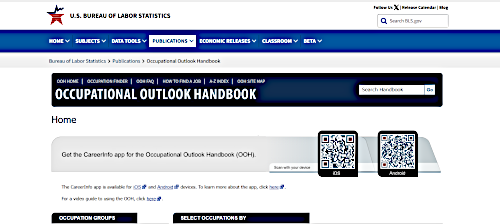Career Exploration
During Career Exploration,
You perform career research.
You identify potential careers.
You begin narrowing career options.
Integrating Occupational Exploration
Into the Curriculum:
Core Subjects and Your Career
An excellent resource is an article entitled “Core Subjects and Your Career”. There are three areas discussed within the article -
“English and Your Career”
“Math and Your Career”
“Science and Your Career”
Each article integrates the subject with career planning.
In the article “English and Your Career”, the definition for communication is “the ability to understand information other people give us and to have other people understand what we tell them”. There are three levels of communication – basic, intermediate, and advanced.
“Basic communication requires the ability to interact with others and to follow simple oral and written instructions…”
“Intermediate communication requires the ability to accurately give and follow instructions, to persuade people to a particular point of view, and to write in an organized and grammatically correct manner...”
“Advanced communication requires a strong ability to communicate both orally and in writing…”
For each level, high school and/or college courses are recommended. The article provides examples of occupations for each level of communication.
Basic communication jobs are bank tellers, bus drivers, cashiers, and correctional officers.
Intermediate jobs are adjusters, investigators, collectors, architects, clerical supervisors and managers, as well as construction and building inspectors.
Advanced jobs are actors, directors, producers, administrative services managers, adult education teachers, and agricultural scientists.
Source: Core Subjects and Your Career (from Occupational Outlook Quarterly)
Internet Resources
The Internet and the libraries are sources of educational and occupational information.
Educational and occupational exploration resources reveal the relationships between learning, work, career information skills, job seeking, skill development, and the labor market. Career planning includes self-assessment, career exploration, decision-making, life role formation, goal setting, and the implementation of career choices. Examples of Internet career exploration resources are Occupational Outlook Handbook and the O'NET, The Occupational Information Network.
Occupational Outlook Handbook
The Bureau of Labor Statistics prepares the Occupational Outlook Handbook.
The Occupational Outlook Handbook reports information on 250 occupations.
The topics within the Handbook are –
Nature of the work
Working Conditions
Earnings
Related Occupations
Training and Qualifications
Other Advancements
O'NET, The Occupational Information Network
Another United States governmental resource is the O’NET.
The Occupational Information Network ( O’NET ) provides the following information –
Occupational profiles
Labor market information
Links to the dot classification systems
Location of 1,100 occupations using skill requirements or key words
Worker Characteristics and Requirements
Experience Requirements
Occupation Requirements, Specifics and Characteristics
Use the Occupational Outlook Handbook and the O'NET, The Occupational Information Network to gather information about potential careers.
The ONET under the O*NET Data section has connections to Abilities, Interests, Skills, and Values.
Activity Sheet for Career Exploration
Download activity sheet.
Use one of the career exploration web sites - Occupational Outlook Handbook or O’NET.
When you go on Occupational Outlook Handbook or O’NET, enter Date Started Date Completed on the form.
What occupations did you gather information on? Are you still interested in that career?
If yes, enter the following information on the form -
Title of Occupations
Source of Information
Are you still interested in that occupation? (YES or NO)






